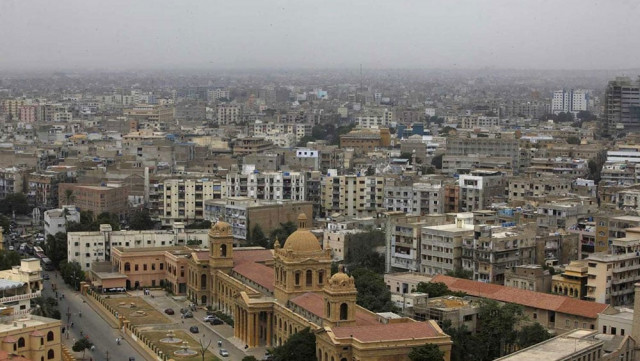Economy will improve if corrective measures are taken
Policy revisions in official mechanisms are ordered by top bosses merely to justify shortcomings

Karachi skyline. PHOTO: REUTERS
I did not mind the dust my clothes caught from these piles of paper since it was of great interest to me. I thought readers too, might need to know what lies in rot in this great state of ours. Proposals for correcting the mechanisms for tax collection, auditing and accountability, departmental procurement and transfer of technology to Pakistan were plentiful in this ocean of ink.
The first thing that came to mind was to get it analysed for three reasons: one, if any of these proposals was translated into notifications; two, if any of these notifications were fit into the governance mechanism; and three, what amount of time and money was spent in getting this heap of stationery blackened.
Pakistan is now a $300-billion economy
I did not hope to find many answers to my first two queries since the policymakers are elusive when it comes to governance proposals. But I was anxious to see what answers come to my last question: the amount of time and money spent on creating these proposals. I was partially obliged, but these answers do not make the real story. The kind of heavyweights involved in this exercise could not be engaged without assurances that my effort meant business. I had to shed a tear or two on the arrogant dismissal their proposals received at the highest bureaucratic levels in Islamabad to get the desired response.
The most important of these proposals was regarding improvement in tax auditing, government expenditure auditing, monitoring and follow-up on works and procurement contracts awarded by government departments, accountability measures for delinquencies in the above mentioned tasks and the working of Central Development Working Party (CDWP) and National Economic Council (NEC).
I was able to conclude that these proposals were not read twice by those in charge, let alone being implemented, after I asked senior bureaucrats the reasons that stalled their progress. They had no idea that Pakistan had a past of producing such gems in offices situated on and around the Constitution Avenue.
They were simply not interested but tended to invent the wheel every day when facing problems in expediting works and improving the performance of the staffs down the tier.
Why they had such miserable conduct is what I actually wanted to know. And to my disappointment, I put this question to a senior bureaucrat who supervised more than a dozen important government organisations at the federal and provincial levels. He smiled, making no secret of his impression that I was some kind of novice in the affairs of Pakistani governance.
The system did not need improvement but scrapping, he thought. But that is not a pragmatic solution anywhere in the world given that a new system is not in place to replace the old one. I informed him of my efforts to find out why important proposals for correcting the system were ignored in the past.
He smiled again and told me that he was part of some of the teams that produced those proposals, the same ones that were rejected by their bosses.
Why in the first place were those proposals in the 1990s and 2000s ordered by the top bosses I naively asked? He again smiled and cautioned me against producing corrective proposals. Such an exercise, he said, is necessary to record inputs from senior officials who struggle to get official notifications producing the desired results.
Pakistan capable of tackling its economic problems
Those guarding this record as a national secret will not allow it to appear in the print and the electronic media. If some of it finds its way to media houses, there can be fruitful but controversial discussion on why such precious proposals were dumped in the 1990s and 2000s.
Such discussion might help the new entrants in the media and the civil bureaucracy. My discussion with the bureaucrats on dumping these proposals helped me conclude the following: these proposals could be lethal in preventing brazen acts of corruption in institutions handling spending, revenue collection and project management for projects sanctioned under the Public Sector Development Programme. This could put breaks on the exercise of awarding government contracts to fraudulent companies that succeed in getting works and supplies contracts only on account of hefty kickbacks they offer to bureaucrats.
There is a mounting din of accountability in Pakistan after the Supreme Court initiated a case against the Sharif family based on the Panama Papers findings. Parallel to this exists is a demand for correcting the working of government organisations where the chief business of bureaucrats is devising newer methods of getting heftier kickbacks.
Accountability and correction go hand in hand. Accountability appears to become a popular slogan in Pakistan. When will correction be a popular slogan as well?
The writer specialises in reporting on strategic issues and political economy. He has worked with leading newspapers of Pakistan over the past 30 years
Published in The Express Tribune, September 18th, 2017.
Like Business on Facebook, follow @TribuneBiz on Twitter to stay informed and join in the conversation.


















COMMENTS
Comments are moderated and generally will be posted if they are on-topic and not abusive.
For more information, please see our Comments FAQ